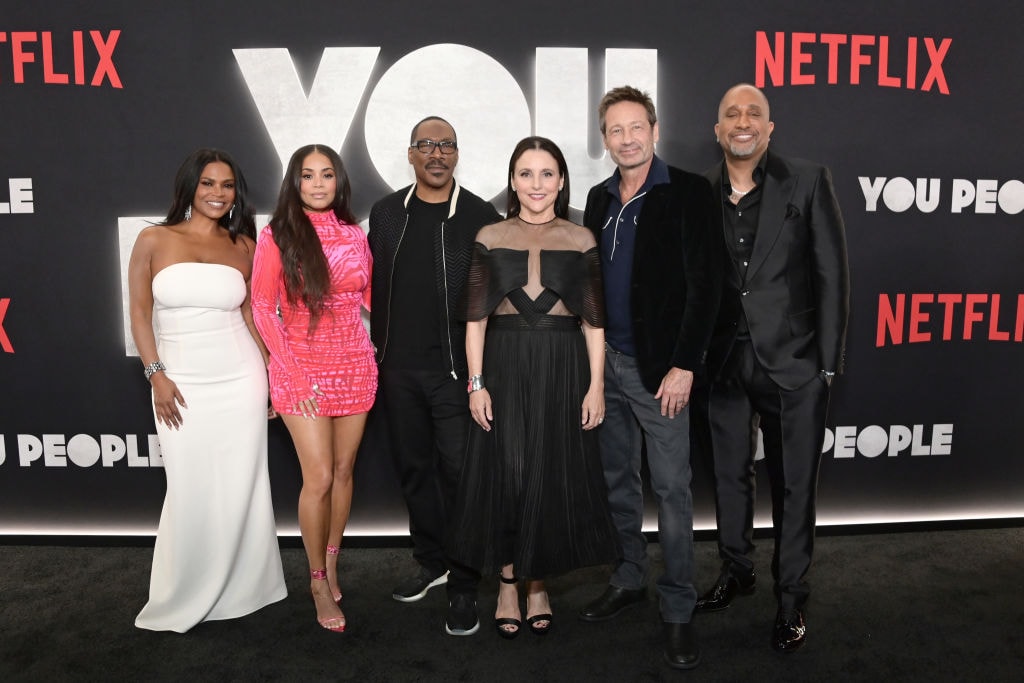We bring news that matters to your inbox, to help you stay informed and entertained.
Terms of Use and Privacy Policy Agreement
WELCOME TO THE FAMILY! Please check your email for confirmation from us.
OPINION: It’s not just the “comedy” that’s empty. It’s the characters as well.
Editor’s note: The following article is an op-ed, and the views expressed are the author’s own. Read more opinions on theGrio.
I was not expecting much from Netflix’s new romantic comedy, “You People.” The trailer for the Kenya Barris and Jonah Hill-written film foretold that the comedy legends and faves Eddie Murphy, Nia Long, Julia Louis-Dreyfus, Hill and Lauren London were underutilized at best with a weak and cringey script. But the overdone premise of a Black-white interracial couple (Hill and London) facing derailment because their families can’t get along had the promising twist of adding Jewish and Muslim faith to the mix.
But in Barris’ hands, it’s just…nothing — for two tedious, aggressively unfunny hours. Even the “jokes” — that lean heavily on fatphobia, antisemitism, anti-Black stereotypes and calling white people “nigga” — are so stale and flaccid that they don’t even offend. You just feel nothing.
(Perhaps I should add a spoiler alert here for the plot of the film, but when the dish is served raw and unseasoned, what’s left to spoil?)
And it’s not just the “comedy” that’s empty. It’s the characters as well. The couple at the center of the families-don’t-get-along trope is the audience anchor. We have to buy into their love to want to get to the inevitable resolution. And while Twitter talk of Hill being unable to pull London in real life was just unnecessarily mean-spirited, the characters they play don’t offer a rebuttal.
Hill’s character, Ezra, and London’s Amira share no passion, no chemistry and offer no reason to understand why these characters would like each other, let alone love each other. Their “love” scenes are more chaste than the films during the Hays Code era. They barely kiss, only allude to sex and leave us to believe that a dating montage of them laughing and enjoying a pair of Gucci slides is enough upon which to build a relationship and withstand the torture of each other’s bigoted families.
Amira is so thinly drawn as to be nothing more than an avatar through which Ezra’s mom (Louis-Dreyfus) and Amira’s dad (Murphy) can battle it out over who’s been more oppressed, Black people or Jewish white people. Where the racial and religious conflict premise could’ve been an interesting angle to explore in other hands, Barris is only interested in Islam as a tool to antagonize Ezra’s Jewish family.
Where Ezra takes up the first quarter of an hour with his Jewish religious and family traditions on display, London’s Amira barely registers as Muslim. The only amplification her family traditions receive occurs during a meeting of the families where her dad mentions their imam and shows off his kufi, a gift from notorious anti-Semite (among other things) Louis Farrakhan.
Though we get to spend time inside of Ezra’s family synagogue and meet his rabbi and community, Amira has no Muslim community outside her family and a brief scene of their imam. What is Black Muslim culture in Los Angeles? A Crips barbershop?, A “Fred Hampton Was Murdered” sweatshirt? A Farrakhan kufi? A pick-up basketball game? That’s all we ever see. But in a Barris production, that’s par for the course; you’re only getting (stereotypical) Blackness through the lens of whiteness.
Ezra even mocks Amira for her sudden interest in having Muslim traditions at their upcoming wedding because she has never expressed any interest in Islam before his mother suggests they have a rabbi facilitate the wedding. And he’s not wrong; Amira has no real beliefs or values other than being a fashion designer who needs men to “keep it real” with her, whatever that means.
As a result of her emptiness, the couple not only avoid having any meaningful discussions or conflicts regarding their religious beliefs, they also never have anything interesting to say about their racial differences.
Attempts at those conversations are reserved for Ezra and his token queer Black best friend (comedian Sam Jay) on their podcast about “the culture.” The two go back and forth about whether Black people and white people can ever actually overcome white supremacy and anti-Black racism to form true community with each other. By the end of the film, when Ezra and Amira’s families have successfully sabotaged their relationship, Ezra begins to agree with his friend that maybe they can’t overcome. Maybe it’s too hard.
Of course, Amira’s dad and Ezra’s mom team up to intervene (presumably) a final time to get the couple back together with a 10-second apology, and the wedding’s back on, bigotry under the bridge. But when the entirety of the racial and religious conflict is only skin-deep, I suppose a Band-Aid will do.
“You People” is streaming now on Netflix.
Brooke Obie is an award-winning film journalist and author of the Black revolution novel “Book of Addis: Cradled Embers.’
TheGrio is FREE on your TV via Apple TV, Amazon Fire, Roku, and Android TV. Please download theGrio mobile apps today!

